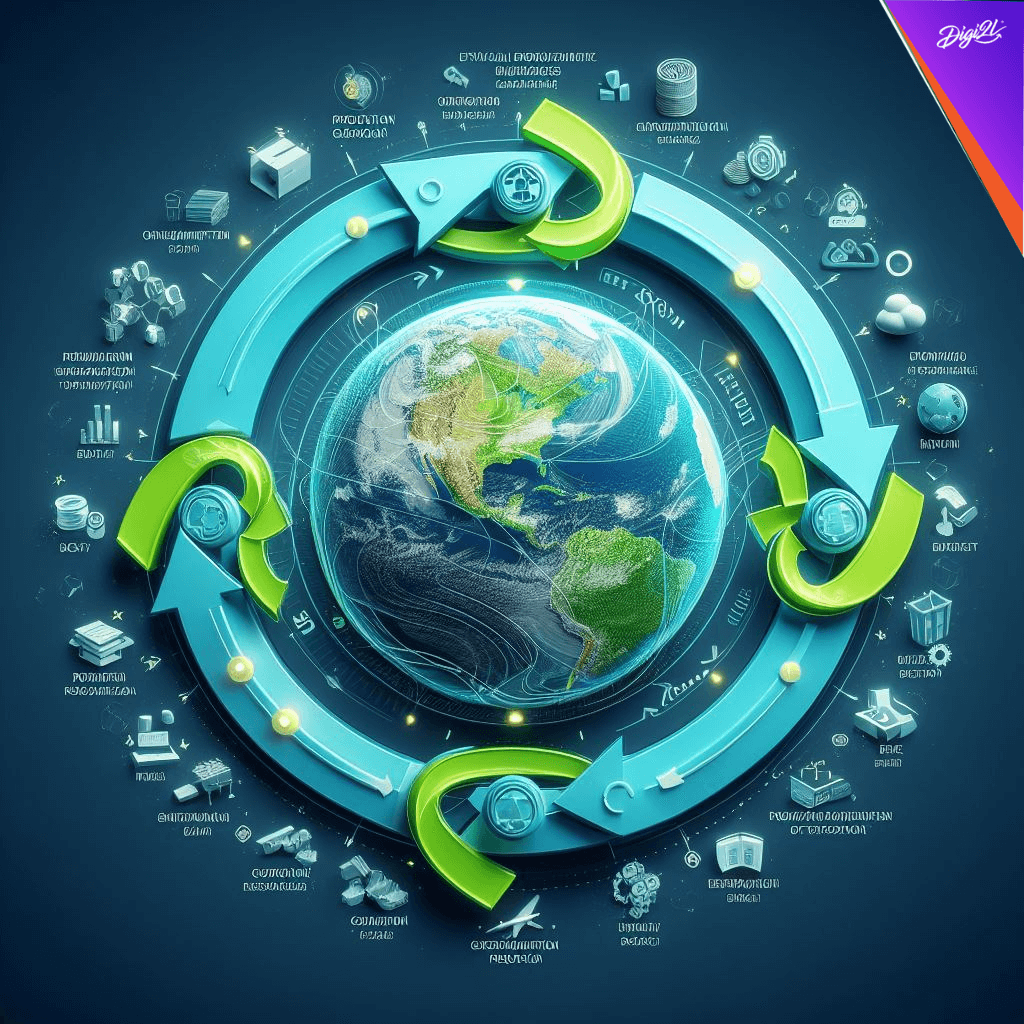
Please Wait ...


Blogs> Harnessing the Power of Circular Economy : Digi2l’s Brand’s vision, Digi2l’s Brand’s Voice!

In today’s global landscape, where issues of sustainability and social equity are at the forefront, the concept of a circular economy has gained significant traction. Departing from the traditional linear model of production and consumption, the circular economy advocates for a system wherein resources are kept in circulation for as long as possible through practices like reuse, refurbishment, and recycling. This shift in approach not only mitigates environmental degradation but also holds immense potential for uplifting marginalized communities, particularly those with low incomes. At the heart of this transformation lies the notion of inclusive business models. By integrating disadvantaged groups into their value chains, brands can create opportunities for economic empowerment and social inclusion. Initiatives centered around collecting and recycling waste materials, for instance, provide jobs and income for individuals living in poverty, thereby contributing to their socio-economic advancement. Moreover, the transition to a circular economy fosters innovation and entrepreneurship, opening doors for marginalized individuals to contribute solutions to environmental challenges while creating economic value. Brands play a pivotal role in supporting these efforts by offering financial backing, mentorship, and access to markets, thus empowering entrepreneurs from diverse backgrounds to build sustainable businesses and improve their livelihoods. Additionally, the circular economy promotes access to essential services and resources, particularly in underserved communities. By developing innovative solutions, such as decentralized renewable energy systems, brands can address pressing needs like clean water, energy, and sanitation, thereby enhancing quality of life and creating opportunities for economic development among vulnerable populations.
Furthermore, by reducing resource dependency and vulnerability, the circular economy strengthens the resilience of marginalized communities in the face of environmental shocks and disruptions. Minimizing resource consumption and waste generation not only mitigates the impacts of climate change but also lessens the burden on finite resources, benefiting those who are most susceptible to resource scarcity. the transition to a circular economy holds great promise for promoting social upliftment, particularly among the lowest income social groups. By reimagining business models, fostering innovation, and promoting access to essential services, brands can create meaningful social and economic impacts that extend beyond profit margins. However, realizing this potential necessitates collaboration and commitment from various stakeholders, including businesses, governments, and civil society. Only through collective effort can we harness the full potential of the circular economy to build a more inclusive and sustainable future for all. Digi2l.in exemplifies this vision through its pioneering efforts in promoting a circular economy. As India’s first brand for purchasing and selling old home appliances, Digi2l.in facilitates the reuse and refurbishment of premium brands, thereby extending the lifespan of products and reducing waste. By making quality appliances accessible to people across different economic strata and ensuring their refurbishment and optimization, Digi2l.in contributes to economic and socio-economic development while championing environmental sustainability.
In the realm of business and sustainability, the concept of a circular economy has emerged as a beacon of hope. It represents a shift away from the traditional linear model of production and consumption, towards a system that aims to minimize waste and maximize the value of resources. At its core lies the principle of keeping materials and products in use for as long as possible, through reuse, recycling, and regeneration. While the benefits of a circular economy are manifold, one of its most profound impacts lies in its potential to uplift the lowest income social groups. In this blog post, we will explore how Digi2l.in brand’s vision of a circular economy can serve as a catalyst for social upliftment.
Understanding the circular economy
Before delving into its socio-economic implications, it’s crucial to understand what the circular economy entails. Unlike the traditional linear model, which follows a ‘take-make-dispose’ pattern, the circular economy emphasizes the importance of closing the loop. This involves designing products and systems that enable the reuse, refurbishment, and recycling of materials, thereby reducing waste and environmental degradation.
Empowering Communities through Inclusive Business Models
One of the primary ways in which a brand’s commitment to the circular economy can uplift low-income social groups is through the adoption of inclusive business models. By integrating marginalized communities into their value chains, brands can create opportunities for economic empowerment and social inclusion. For example, initiatives that focus on collecting and recycling waste materials can provide employment and income-generating activities for individuals living in poverty.
Fostering Innovation And Entrepreneurship
The transition to a circular economy requires innovation across various sectors, from product design to waste management. This presents an opportunity for entrepreneurs, including those from disadvantaged backgrounds, to contribute solutions that address environmental challenges while creating economic value. Brands can support these efforts by providing funding, mentorship, and access to markets, thereby empowering individuals to build sustainable businesses and improve their livelihoods.
Promoting Access to Essential Services And Resources
In many low-income communities, access to essential services such as clean water, energy, and sanitation remains limited. By embracing the principles of the circular economy, brands can develop innovative solutions that address these challenges while generating social and economic benefits. For example, decentralized renewable energy systems can provide off-grid communities with access to clean and affordable power, improving their quality of life and creating opportunities for economic development.
Reducing Resource Dependency And Vulnerability
Low-income social groups are often disproportionately affected by resource scarcity and environmental degradation. By minimizing resource consumption and waste generation, the circular economy can help reduce dependency on finite resources and mitigate the impacts of climate change. This, in turn, can enhance the resilience of vulnerable communities, enabling them to better cope with environmental shocks and disruptions.
In conclusion, the transition to a circular economy holds immense promise for uplifting the lowest income social groups. By reimagining business models, fostering innovation, and promoting access to essential services, brands can create positive social and economic impacts that extend far beyond their bottom line. However, realizing this potential requires collaboration and commitment from all stakeholders, including businesses, governments, and civil society. Only by working together can we harness the power of the circular economy to build a more inclusive and sustainable future for all.
Digi2l.in is a startup, which is India’s first brand for the purchasing and selling of old home appliances and holds it’s contribution in the promotion of circular economy and attempting it’s best in reaching out to people of every economic and socio economic strata in it’s services, in the form of the supply of best second hand old home appliances of premium brands after making sure of it’s complete refurbishment and optimization with further providing additional warranty as per the preference of the customers interested. We hold a step via our business model towards the economic and socio economic development of the nation and an initiative towards a greener eco-system.

By Digi2L - June 8, 2024

By Digi2L - June 7, 2024

By Digi2L - June 6, 2024